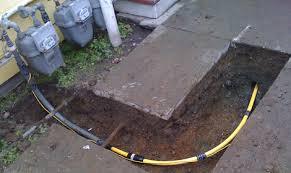Gas Line Services Product Description
Gas line services encompass a range of solutions designed to install, maintain, and repair gas lines for residential, commercial, and industrial applications. These services ensure the safe and efficient delivery of natural gas or propane to various appliances, heating systems, and equipment. Proper installation and maintenance of gas lines are crucial for preventing leaks, ensuring compliance with safety regulations, and optimizing energy efficiency.
Uses of Gas Line Services
- Residential Applications: Installation of gas lines for stoves, water heaters, furnaces, and outdoor grills.
- Commercial Applications: Providing gas services for restaurants, hotels, and other businesses that rely on gas-powered equipment.
- Industrial Applications: Supporting manufacturing processes that require gas for heating, powering machinery, or other operational needs.
- Leak Detection and Repair: Regular inspections and repairs to prevent gas leaks, ensuring safety for occupants and compliance with local regulations.
- Upgrades and Modifications: Adjusting existing gas lines to accommodate new appliances or renovations in homes and businesses.
Technical Data Details
| Feature | Description |
|---|---|
| Material | Typically made from black iron, copper, or polyethylene. |
| Pressure Rating | Standard residential lines operate at 0.5 psi; commercial lines can handle higher pressures. |
| Pipe Sizes | Common sizes range from 1/2 inch to 2 inches in diameter. |
| Installation Standards | Must comply with local building codes and regulations (e.g., NFPA 54, ANSI Z223.1). |
| Leak Detection Methods | Utilizes gas detectors, pressure testing, and visual inspections. |
| Service Life | Properly installed and maintained gas lines can last 30 years or more. |
| Safety Features | Includes shut-off valves, pressure regulators, and odorization of gas for leak detection. |
| Maintenance Frequency | Recommended inspections every 1-3 years, depending on local regulations and usage. |
Conclusion
Gas line services are essential for ensuring the safe and efficient use of gas in various applications. By understanding the technical specifications and uses of these services, homeowners and businesses can make informed decisions about their gas line needs, ensuring compliance with safety standards and optimizing energy efficiency.

